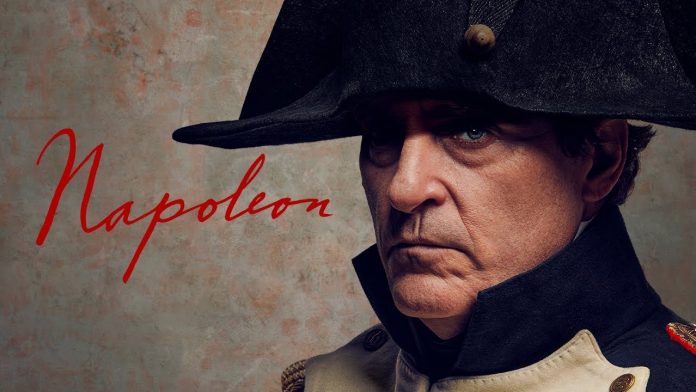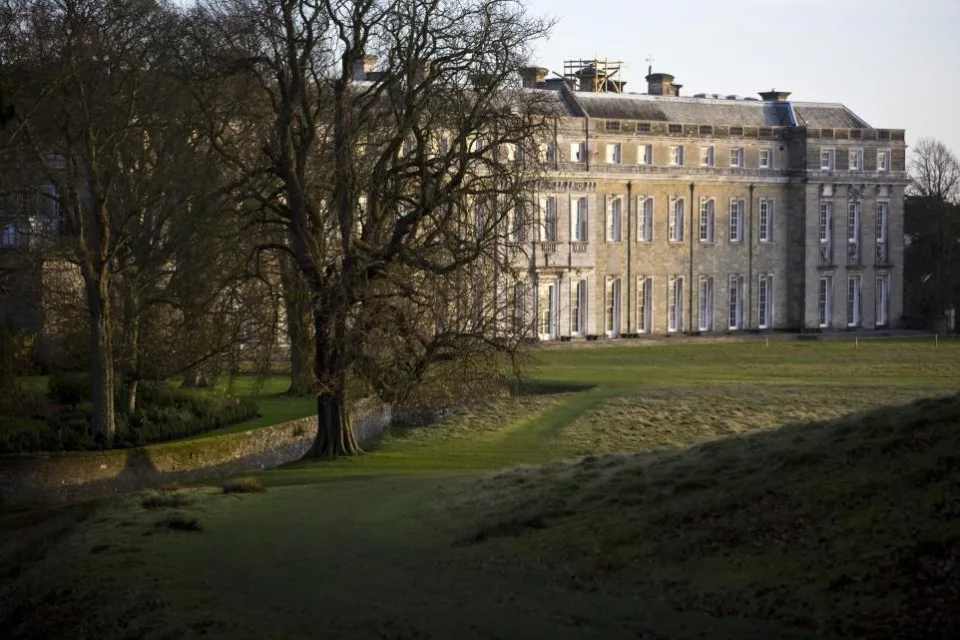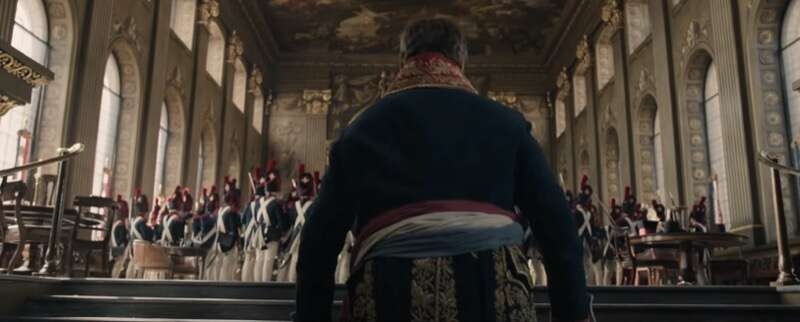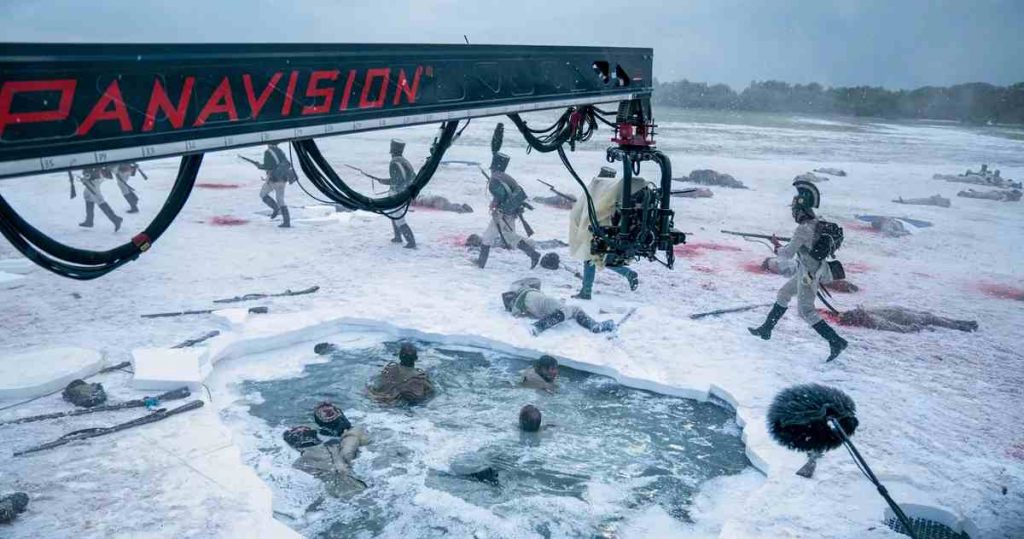The highly awaited movie “Napoleon“ (2023), which is produced and directed by the renowned Ridley Scott, will transport you on a historical cinematic adventure. This $200 million, 157-minute epic is expected to be the last word on the legendary French ruler, depicting his incredible ascent and descent. The film, which stars Joaquin Phoenix as Napoleon and Vanessa Kirby as Empress Joséphine, offers a distinctive and intimate look at Napoleon’s humble beginnings and turbulent rise to power. His obsessive and frequently tumultuous relationship with Josephine, his one true love, frames the story.
The film looks to be a spectacle-filled action epic, set against the backdrop of significant historical conflicts and highlighting Napoleon’s innovative military strategies. Napoleon’s life is explored in depth by the creators, who successfully convey the spirit of his unwavering ambition and extraordinary strategic acumen. The film encourages viewers to experience the turbulent path of one of history’s most intriguing characters; it is more than just a historical drama.
Let’s examine the start of this epic masterpiece’s filming as well as the intriguing locales that were selected to bring this historical drama to life as tvacute delves into the specifics of the production.
When did the filming of Napoleon (2023) begin?
According to sources, principal production for the Joaquin Phoenix film began in February 2022 under the working title ‘Marengo,’ a reference to the Battle of Marengo. When the cameras began to roll in February 2022 to capture the essence of Napoleon Bonaparte’s life, the cinematic spectacle known as “Napoleon” began to take shape.
With the careful guidance of director Ridley Scott, who has helmed blockbuster hits such as “Gladiator” and “Black Hawk Down,” the production crew set out to capture Napoleon’s journey in a mere 62 days. Scott used a crew of nearly 900 people and his Napoleonic delegating skills to film with efficiency which is a credit to his experience.
The film ‘Napoleon’ was shot in many locations including England, Malta, France, and Morocco. Specifically, filming took place in Buckinghamshire, Farnham, Kalkara, Kettering, Lincoln, Merzouga, Oxfordshire, Paris, and Sussex, Surrey.
Napoleon (2023) Filming Locations in England
The filming of “Napoleon” (2023) was largely conducted against the backdrop of England’s magnificent landscapes, which effectively captured the essence of historical events that were crucial to the life of Napoleon Bonaparte. One particularly noteworthy site was Lincoln, England, where the team spent a week getting ready to build Lincoln Cathedral, a breathtaking architectural marvel that served as a stand-in for Notre-Dame de Paris. On March 17 and 18, the cathedral saw historical events reenacted, perfectly encapsulating the spirit of Napoleon’s time. Because of its lengthy history, the cathedral served as a realistic backdrop for several pivotal moments in the movie, drawing viewers into Napoleon’s realm.
The Old Royal Naval College in Greenwich, London, Petworth House in Sussex, Blenheim Palace in Oxfordshire, West Wycombe Park, Stowe Avenue and House in Buckinghamshire, and Boughton House in Kettering were among the other noteworthy English locales. The latter, a UNESCO World Heritage site, experienced a metamorphosis when its colonnades were transformed during the French Revolution into the streets of Paris. Lord Nelson attended the Royal Naval College, which has historical relevance. This connection between the film and Napoleon’s renowned enemy gave the movie additional layers of legitimacy.
Napoleon (2023) Filming Location in Sussex
Sussex has a significant place in the vast tapestry of settings selected for the filming of “Napoleon” (2023), as it is home to the famous Petworth House, a rural estate from the 17th century. With its lavish state chambers, wide staircases, and French-style interiors, this National Trust house served as a major location for multiple pivotal moments in Ridley Scott’s epic biopic that chronicled the remarkable life of Napoleon Bonaparte.
The producers decided to use actual sites that could accurately depict the palaces and stately residences central to Napoleon’s story, rather than depending on built sets and computer-generated imagery. Petworth House proved to be the perfect option with its characteristic French features, large staterooms, and collection that reflected generations of continental European taste.
“There is enough neo-classical architecture in England to make it possible,” said production designer Arthur Max, “probably because a lot of the design that comes out of France and England is based on Italian classic Palladian architecture.” Max went on to explain the appeal of Petworth House. The location’s flawless integration of Napoleon’s era architectural aspects brought viewers to the heart of that era.
Two days in March 2022 were dedicated to filming at Petworth House, and many members of the main cast, including Joaquin Phoenix and Vanessa Kirby as Napoleon’s first wife Josephine, were present. This production was the largest at Petworth ever, with 130 members of the main cast, 120 supporting artists, and 200 crew members.
Napoleon and Josephine had a crucial meeting in the Victim’s Ball scene, which took place in a number of rooms including the Marble Hall, Carved Room, Beauty Room, Little Dining Room, and on the grand staircase. The period was brought to life by the painstaking attention to detail and the moody lighting, which turned Petworth House into an alluring setting.
The Square Dining Room had two functions: it was the location of Jacques-Louis David’s workshop, where the painting of Napoleon’s coronation portrait was completed. A pivotal conference between Napoleon and his generals took place in the magnificent Marble Hall at Petworth House, providing viewers with a preview of the strategic talks shown in the movie’s trailer. Filmmakers and Petworth House worked together to create an incredible experience in spite of practical obstacles, and the money they made helped to preserve this historical treasure.
Napoleon (2023) Filming Location in Abingdon Airfield
The ice scene in the 2023 film “Napoleon” depicts the intensity and strategic genius of the Battle of Austerlitz, one of Napoleon Bonaparte’s most well-known tasks, as it develops as a turning point. Showcasing the French army’s strategic prowess, the scenario is shot on a frozen lake and is created as a digital composite of two locales that highlights Dariusz Wolski’s cinematography and Ridley Scott’s directing skills.
The frozen lake is a computer construct created from Abingdon Airfield near London, while the forested hill that serves as Napoleon’s command post is located in Bourne Woods, Surrey. As adversaries dive into the freezing waters, a visually striking and suspenseful moment is created by French gunners firing cannons at the lake during the climax. Hand-drawn storyboards, a combination of real effects and computer-generated imagery, and careful preparation by Ridley Scott all come together to create a cinematic extravaganza that perfectly conveys the dramatic and momentous nature of the Battle of Austerlitz.
Napoleon (2023) Filming Location in Painted Hall
The film included a prominent part of the Painted Hall, an architectural marvel located within the Old Royal Naval College. Known for its historical significance, this baroque building was transformed into a visual extravaganza for the film, providing a backdrop for military skirmishes that heightened the production’s overall grandeur.
Looking more closely at the specifics of the shooting sites, we can see that the Old Royal Naval College in Greenwich was essential to re-creating the streets of Paris. The colonnades of this historic edifice were expertly changed, providing a dramatic picture of the period during the French Revolution, according to Royal Museums Greenwich. The location, with its historical significance associated with Lord Nelson, gave the movie an additional degree of realism by linking it to Napoleon’s acknowledged enemy.
Inside the Old Royal Naval College, the Painted Hall, which dates to 1705, provided an amazing setting for the film’s battle scenes. The historical depth depicted in the movie is enhanced by the baroque building erected by Sir James Thornhill, which not only witnessed historical events but also served as Lord Nelson’s final resting place.
Locations for Napoleon (2023) Filming in Malta
Another notable location for the movie was Malta, where Fort Ricasoli in Kalkara was used to recreate the scene of the Siege of Toulon in 1793. Napoleon’s first major victory was achieved at this key location, and the producers went to great lengths to recreate the period atmosphere.
Malta is a southern European island. Of the three main islands that make up the Maltese Archipelago, it is the biggest and most populated. Situated immediately to the south of Italy and to the north of Libya, the island is part of the Mediterranean Sea.
Essentially, the Parisian and English locales used for “Napoleon” (2023) filming served as more than just backdrops; they were essential to the narrative. Every setting, from the imposing cathedrals of Lincoln to the recreated streets of Paris in Greenwich, was essential to making history come to life on screen. The excitement among viewers is building for an immersive experience that skillfully combines the breathtaking scenery of these places with the gripping account of Napoleon Bonaparte’s remarkable life, as they eagerly await the film’s debut.
“Napoleon” (2023) Locations Merzuga desert, Morocco
It is important to distinguish between the Napoleonic Wars and the French conquest of Morocco that started in 1907. The filmmakers opted to film numerous scenes in Morocco’s Merzouga desert, including Napoleon’s invasion of Egypt (no, the Sphinx and Pyramids shown in the teaser are not real).
Situated in southwestern Morocco, the Merzouga Desert is an enormous and breathtaking stretch of golden sand characterized by towering dunes that undulate in response to wind. There are all sorts of animals hanging out and making themselves at home, including snakes, lizards, camels, and fennec foxes.
The Frozen Lake Scene in Abingdon Airfield: Explained!
The master photographer, Ridley Scott, provided insights into the difficult process of bringing ancient battles to life. The action takes place on a frozen lake, which acts as the French and Russian soldiers’ battleground. In the original historical event, which took place on December 2, 1805, the French army strategically fired cannons onto the ice as the Russian soldiers withdrew after being enticed into the frozen lake. This historical strategy is faithfully and painstakingly brought to life in the movie.
The viewer is fully submerged in the icy ambiance of the winter battlefield as the camera moves across the frozen terrain. The fact that the forested hill that serves as Napoleon’s headquarters is located in Bourne Woods, close to Surrey, England, lends the image more realism. Because every scene is meticulously planned and carried out, Ridley Scott’s use of hand-drawn storyboards contributes to the creation of a visual extravaganza that reflects his creative vision.
The director started his approach with hand-drawn storyboards, a technique that dates back to his time as a painter at the Royal College of Art in London. Because of this aesthetic basis, Scott is able to adapt his ideas onto the screen with ease, and the resulting films frequently have similarities to his initial paintings. His use of numerous cameras at once, which speeds up production and captures the raw intensity of battle moments, is an obvious example of how effective his filmmaking is.
The conflict centers on the frozen lake, a digital composite made from Abingdon Airfield near London. The director’s dedication to safety and pragmatism is demonstrated by his choice to forego filming on a real lake. The subtleties of the Battle of Austerlitz are brought to life, highlighting the strategic acumen of the French army and the intensity of the situation.
At the scene’s culmination, Joaquin Phoenix‘s portrayal of Napoleon issues a dramatic hand signal to the French gunners, instructing them to fire cannons at the frozen lake. The spectator is given a visceral experience by the sound mix, which amplifies the force of the explosions. A degree of reality is added to the cinematic portrayal as the retreating opponents, who are portrayed by a combination of live performers and computer-generated imagery, dive into the frigid waters below.
The mayhem below the ice is captured in underwater scenes that were shot in a tank on a Pinewood Studios soundstage. To give the dangerous scenario a sense of realism, the production team constructed a hole near the airstrip where soldiers and horses would fall through the ice. The action is brought to life by stunt players, who take a chance of being trampled by hooves inside the tank, providing a lasting image of the difficulties and sacrifices made during previous conflicts.
In conclusion, Ridley Scott and his crew’s “Napoleon” (2023) succeeds not only as a movie but also as a well-researched historical odyssey. A film masterpiece that is sure to become the standard portrayal of Napoleon Bonaparte is the result of the crew’s and actors’ combined efforts, historical accuracy, and location selection. As the movie approaches its premiere, viewers can expect a time-traveling, immersive experience that brings one of history’s most fascinating individuals to life on the big screen.
















